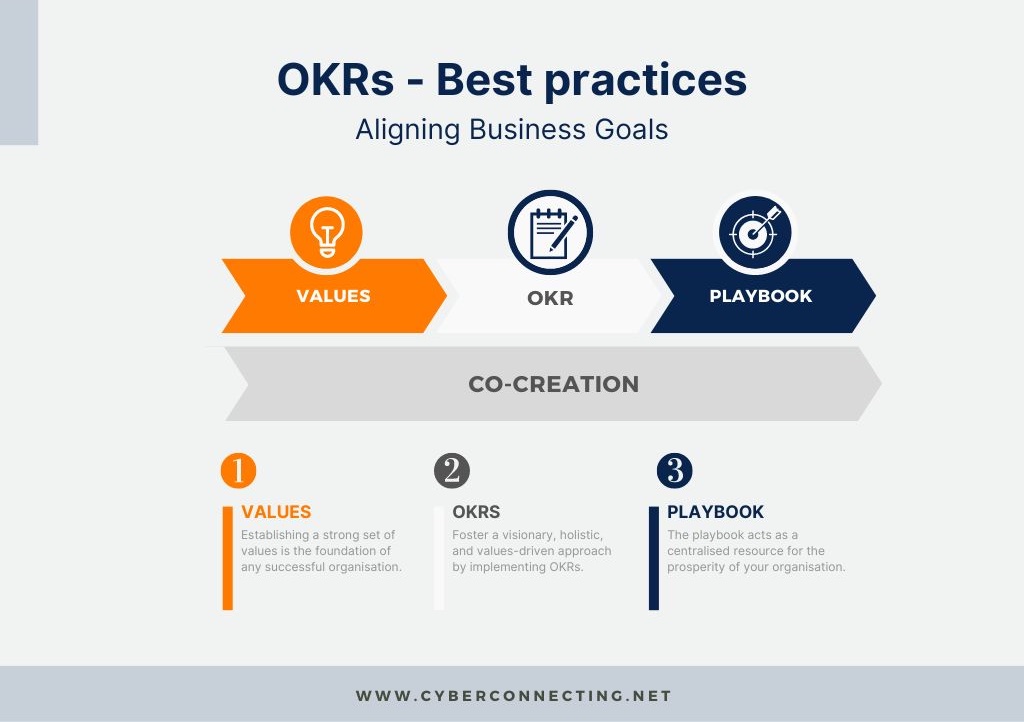Aligning organisational goals with individual and team objectives is a critical aspect of driving success and growth within a company. Objectives and Key Results (OKRs) offer a structured and effective approach to achieving this alignment. This blog post explores the best practices for implementing OKRs in your organisation, from establishing company values to creating a playbook.

By following these practices, including the approach of co-creation, you can foster a visionary, holistic, and values-driven approach that will guide your teams towards achieving their goals. Co-creation enhances collaboration and empowers individuals to contribute their unique perspectives, driving success.
Defining Company Values
Establishing a strong set of values is the foundation of any successful organisation. Values can be created through exploration and negotiation with workers across departments, typically in a workshop setting. If you work predominantly remotely, the value definition process presents a unique opportunity for an onsite get-together.
Alternatively, values can be measured using instruments specifically designed to surface values, such as
Vaeliou. When defining values, it is crucial to consider the demographic and cognitive diversity of individuals within your organisation. By valuing diversity, you create a culture that embraces different perspectives and promotes inclusivity.
Thriving through OKR
OKR Introduction and Kick-off
To effectively introduce OKRs to your teams, start with an overview of their purpose and alignment with the company values defined in Step 1. Highlight the benefits of OKRs in achieving company goals and emphasise the importance of individual and team contributions. Our recommended format for kick-off is an in-person or online interactive workshop supplemented with pre-reading materials and engaging activities. The format will ensure that participants are well-prepared and actively involved.
Tailored OKR Questionnaire
Hold individuals and teams accountable for their OKRs by providing tailored questionnaires that explore their input and regular contribution. Enhance this process with 1:1 mentoring and coaching sessions, enabling individuals to receive guidance and support for their objectives. This personalised approach fosters a sense of ownership and responsibility among team members.
OKR Implementation and Application
Conduct workshops on best practices to guide your teams in implementing and applying OKRs effectively. Review outcomes from the previous step and offer insights on refining and optimising OKRs. Additionally, address selecting suitable tools based on cost, security, and technical fit. Sharing best practice examples from your industry can inspire and motivate your teams, providing real-world context for successful OKR implementation.
Sporting the Ultimate Playbook
Incorporating OKRs into your company playbook can revolutionise your business processes. The playbook acts as a centralised resource, capturing and sharing vital information for the prosperity of your organisation. To ensure its ongoing relevance and value, follow these streamlined steps:
Run Mini-Workshops
Host specialised workshops aligned with the defined sections in the playbook, such as company values. These sessions provide valuable opportunities for knowledge sharing and collaboration among your employees.
Appoint a Note-taker
Designate a team member as the note-taker during workshop sessions. Their role is to capture key insights and discussions that arise, preserving the essence of the discussions.
Engage an expert team member to review the notes, ensuring accuracy and maintaining high-quality content. This additional validation step enhances the credibility of the playbook.
Insertion into the Playbook
Invite the note-taker to incorporate the reviewed notes into the company playbook. This collaborative approach guarantees accurate information representation, reflecting the collective knowledge of your organisation.
Assign rotating curators to update and maintain the playbook regularly. The playbook remains current and relevant by adapting to the evolving business landscape.
By implementing these concise and effective steps, your playbook becomes a powerful tool for aligning and improving your business processes through OKRs. It is a valuable resource that empowers your organisation to achieve its goals and thrive in today's dynamic business environment.
Conclusion
Following these best practices for OKRs, from establishing values to creating a playbook, can drive effective goal alignment and propel your organisation towards success. Embrace a visionary, holistic, and values-driven approach to OKR implementation, encouraging diversity and fostering team accountability. With an updated playbook and a shared understanding of company objectives, your organisation will be well-equipped to navigate the ever-changing business landscape and achieve remarkable results. Start implementing these best practices today and unlock the full potential of OKRs.
Schedule a Complementary Call

